- Home
- Julie Smith
Jazz Funeral (Skip Langdon #3) (Skip Langdon Mystery) (The Skip Langdon Series) Page 11
Jazz Funeral (Skip Langdon #3) (Skip Langdon Mystery) (The Skip Langdon Series) Read online
Page 11
“Well, Ham, of course, after I mentioned she was always making goo-goo eyes. I thought he was so innocent he just hadn’t noticed. But he said he’d kind of, you know, done it with her once when they were both kind of drunk, and she never could forget. It embarrassed him, but he had to put up with it. He sure wasn’t going to fire her just because he was embarrassed. Ham wasn’t like that.”
“How long has Ariel worked for him?”
“Oh, three years, I guess.”
“Did that incident happen before or after you came on the scene?”
She threw back her head, hair falling prettily about, and laughed as if she was truly delighted. “See, I’m not dead. I can laugh a little bit. If it was after I met him, then I’d be the one with a motive, wouldn’t I?”
“You sure would.” Skip held her gaze, smiling just as broadly as Ti-Belle.
“Well, it was before. Of course. Whatever else you say about Ham, he was an honorable man.”
“Everyone says so.” Saint Ham. “Who else is on the list?”
“His dad and his uncles.”
Skip was shocked. “Acting in concert?”
“Oh, God, I hope not. But I s’pose anything’s possible.”
“Why would his dad and his uncles want to kill him?”
“Business disagreements. They were always arguing about what to do with the damned sandwich places.”
“And what was the basis of the argument?”
She leaned forward, defiant. “Frankly, I never asked. I just never was that interested.”
“How did you know about the arguments?”
“Oh, Ham’d be in his study talking on the phone, and then he’d come out all red in the face and huffing and puffing. And he’d say, ‘Dad’s crazy.’ Or ‘Uncle Joseph doesn’t have an ounce of business sense.’ Or something like that, which meant he was sick and damn tired of talking about it and don’t get him started. Which I wouldn’t have dreamed of.”
Skip said, “Is that all your suspects?”
“Well, I can’t decide about Patty.” She paused and gave it some thought. “Yeah, I guess she’s one. Just ‘cause they hated each other. Patty and Ham.”
“Why?”
“Jealousy, looked like to me. Just plain old jealousy, pure and simple. Patty married his dad pretty soon after his mom died. He was a dweeby teenager who was probably always trying to get attention, and cramping Patty’s style.”
“I take it you don’t much like Patty either.”
“Well, I don’t mind her. It’s just that she’s so …” She searched for the word.
“What?”
“Worthless, I guess. Once I said she had pretty nails and asked her how she kept ‘em so nice. She held ‘em out, all ten of ‘em for me to see, like some kind of window display, and said, ‘Honey, I don’t do shit.’ With this big Southern Belle smile. Like she was real proud of it. I mean, if you’re a parasite, do you really have to brag about it?” She was getting looser and looser as she warmed to her subject. “No wonder Ham couldn’t stand her. That poor boy needed a mother, and his dad married a Barbie doll.” For a moment her eyes filled with tears, presumably at the plight of the motherless, dweeby Ham. “That gumbo he was making—you know when he learned to make it? Then. When he was a kid. Patty didn’t cook, and his dad wouldn’t hire a housekeeper, so poor little Ham taught himself to make gumbo. It was his mom’s recipe, except for the tasso. He was so proud of thinking of that.” She cupped her face in her hands and brushed hard with the fingers. Skip couldn’t tell if the tears were real. It occurred to her that, in Ti-Belle’s estimation, just about everybody Ham knew had a motive for killing him.
“You haven’t mentioned Melody,” she said. “Is she on the list too?”
“Melody?” She sounded thunderstruck. “Never! Little Melody? She adored Ham. And he adored her.”
“She was on the scene.”
“I know, and I’m worried. Maybe they got her too.” Her chin trembled.
Skip said, “I hear she adores you too.”
Ti-Belle looked puzzled. She nodded. “We’re close. We’re real, real close. But she hasn’t called. Why hasn’t she called if she’s all right?”
“We’re looking for her. Just as hard as we can.”
Ti-Belle smiled dreamily, free-associating the way people do when they’re trying to get their minds off something. “She’s such a sweetheart. Reminds me so much of me at her age. Wantin’ a ticket out. Wantin’ it real bad.”
“Ticket out? You mean … suicide?”
“Oh, never. Not in a million years. Do I look to you like that kind of person?”
“I thought you meant Melody.”
“She’s just like me. That’s what I’m saying. Look, Melody’s life’s not a pretty picture. Whose is at that age? Honey, that’s what the blues is about. Being sixteen and wantin’ out.” Right then she had such a bruised, bluesy air about her, so world-weary, so knowing, that she really should have been sitting around in her underwear, chain-smoking and playing cards between tricks.
“What’s so terrible about Melody’s life?”
“Her parents don’t give a shit about her.”
“I keep hearing she’s the apple of George’s eye.”
“La-di-da.”
“I beg your pardon?”
“Look, you could be his favorite person in the world and you still wouldn’t notice. If he hugged you, you’d probably catch a chill. And Patty’s into makeup and hypochondria. Melody needs something.” She leaned back, her point made. “And that’s the blues. It’s being in a town way too small for you, and itching. Just itching. Crying yourself to sleep but never losing hope ‘cause you got your music.”
The words were like something she might have said onstage to introduce a song, but the pain in her face told Skip how heartfelt they were. She was enthralled. And wondered if this was the blues too—perhaps a true artist didn’t have to sing, just to tell her story. “And what was that town for you?”
“St. Martinville. I grew up with Cajun music, and it was the only thing in my life that made it worthwhile. We were dirt-poor and I was miserable—maybe my life was no worse than any other kid’s, maybe I was just more sensitive. My little brother didn’t seem to take it so hard. Maybe that’s what makes you sing—you just take things too damn hard. Anyhow, I wanted out of there in the worst kind of way. I got a scholarship to LSU and that was it. In the summer I’d come down here and sing in the Quarter, make enough money to go back to school a little while longer. Finally quit school—it did what it was s’posed to do. Got me out of there and over the hump.”
“You could make enough, just on the street?”
“Oh, yeah. On a good day you might rake in two or three hundred dollars. But I waitressed some too.”
“Did you talk about it with Melody?”
“Sure. That and everything else.” Unexpectedly, she lost her animation, sat rigid, as if remembering something, and burst out: “Oh God, oh God, oh God, don’t let anything happen to that kid!”
“Do you have any idea where she’d go if she ran away? Any special friends or relatives she might try to reach?”
Ti-Belle shook her head.
“Listen, on another subject—I hate to bring this up, but I have to ask you about your relationship with Ham.”
She smiled, an ironic smile, bittersweet. “You mean, did I have reason to kill him? Oooooh, yes. And I loved him to pieces. We fought all the time. Absolutely all the time. Honestly, I don’t think it was ever going to get better either. I think I might have ended up leaving him.”
“What did you fight about?”
“Ham couldn’t … he wouldn’t … I don’t know, he just couldn’t take any kind of change at all. He was so passive, it was like living with a giant oak tree instead of a man. Just somethin’ growin’ in the middle of the road, stopping traffic. You realize this is the house he lived in with his wife?” She was angry now, her voice rising, her eyebrows working. “His wife! I’ve got no id
ea why I agreed to move in here. I guess I just loved him so much it never occurred to me there could be problems. But then after we’d been together awhile, we needed a place that was ours, not his. And certainly not hers. Well, he wouldn’t even talk about it. He said this was where he lived. I mean, he’d rather keep it than me!
“He wouldn’t let me buy new furniture. Now I don’t mean he wouldn’t give me the money; I might have cash-flow problems, but I do have charge accounts. I mean, I’d buy something new, have it delivered, and he’d get anxious. He said it was mine, not his, and that made him feel pushed. Pressed. Smothered. Something like that, I never could quite get it. So I’d say, fine, let’s go pick out something together, or even, you go out and get something. You see what this stuff is?” She indicated the contents of the room. “Just any old thing. But if he picked out something he liked, then he’d have to decide what he liked, which he knew he couldn’t do. He was just too damn neurotic. So I had to put up with this shit. I couldn’t pick out something, and he wouldn’t go with me to get something, and he wouldn’t do it himself. You see why I wanted to kill him sometimes?” Her voice had risen almost to a scream.
She was quiet for a moment, and Skip thought the silence felt good. Ti-Belle could get up quite a head of energy when she was angry. No wonder the neighbors had heard the battles.
When the singer spoke again, it was in the quiet voice of remembered grief. “And now I’d give anything to have him back again.”
“I know.” I know the right thing to say, anyway.
“I’ve thought about what happened. It seems like he was talking to somebody and they got mad enough to really do it, doesn’t it? Well, I could have done that, except that …” She shrugged. “It’s just not the sort of thing you kill someone over. He was the most frustrating man in the world, but it was nothing personal. If you killed somebody, wouldn’t you have to have a damn good reason?”
No. Blind rage is plenty good enough. Particularly if there’s alcohol or drugs involved. But if Ti-Belle didn’t know that, maybe she was putting up a smoke screen. Skip thought she’d poke around a little, see if she hit any sensitive spots.
“Did you fight at all about getting married? Did one of you want to and the other one didn’t?”
The ravishing Ti-Belle spoiled her image by snorting. “He was still married to Mason!”
“What?”
“Yeah. Five years later. And that’s over. Way over. Ham was just too damn wimpy to get a divorce. That would require positive action, and Hamson Brocato never took positive action, oh no.” She was off again. Anger may have felt better to her than grief.
But this Mason thing was food for thought. “Did Ham have a will?”
“I don’t know. Why? Probably not, why would he?”
Right, why would he? A man who couldn’t even be bothered to get a divorce wasn’t going to make a will. It was funny, Mason had used the same word Ti-Belle had—wimpy. But Mason was no wimp. Why hadn’t she taken care of the divorce?
Ti-Belle’s thoughts were still on marriage. “Look, I’m not the kind of woman who just wants to get married. It isn’t my thing, maybe never will be. I’ve got a career going. I thought Ham was going with me, maybe as my manager. I used to think we’d work as a team, but I was starting to think it just wouldn’t happen. Couldn’t. Probably shouldn’t.”
“Why not?”
“Well, it turned out his main talent was schmoozing.” She spoke with the sadder-but-wiser air of someone who’s learned the hard way.
Skip thought she’d learned everything she was going to learn from Ti-Belle. It was time to play the bad cop. “Ti-Belle, I checked all flights out of here for a week. And I checked with Mr. Jarvis Grablow in Chicago. You didn’t go anywhere.”
The beautiful face registered disbelief and then panic. It was probably about to be replaced by anger, and if Ti-Belle was as volatile as she seemed, she might attack. Skip got ready. But the human volcano had burned itself out. She fell back in her chair, defeated. “Oh, shit!”
Skip breathed a sigh of relief. “Where were you?”
“Oh, fuck!”
“You didn’t really think you were going to get away with it, did you? With a shaky alibi like that?”
“Get away with what? I didn’t kill Ham, for Christ’s sake. I was with a man, okay? Ham got to me. He wore me down. I needed some …” She sniffled a bit “… some self-esteem from somewhere. He wasn’t around, he was putting everything into JazzFest, I was frustrated, I felt like our relationship was coming apart….”
“You don’t have to make excuses to me.”
She made a face that was like a funny little half smile. “I guess I was really talking to Ham. Do you have any idea how awful I feel? I was in bed with somebody else while he was getting killed!” Loud voice again. Mad at herself—or a good actor. “I might have saved him, do you realize that? If I’d have only been here.”
She raced out of the room, Skip following. But she was only getting a tissue. She came back dabbing and patting at her face. “Actually, I feel better. I really do. I couldn’t talk to anybody else about this, might as well be a stranger.”
Skip smiled, momentarily the good cop. She said, “Who was the guy?”
“The guy? I have to tell you that?”
“Either that or get a lawyer fast.”
“Shit!” She thought it over. “Okay—it was Johnny Murphy. My drummer.”
CHAPTER NINE
As she shut the door behind the damn cop, Ti-Belle threw her Kleenex at it. But that wasn’t good enough, so she went back in the living room and threw each of the sofa cushions across the room.
“Shit!
“Fuck!
“Shitfire!
“Motherfucker!”
The pilows didn’t make any noise, so she picked up a little ceramic box—ugly thing Ham wouldn’t let her deep-six—and threw it against the wall. “Goddamn, motherfucker!”
To her disappointment, it only hit the wall and fell to the carpet. There was a good thwack, but no satisfying shatter.
“Goddamn, goddamn, goddamn!” She hated the cop, she hated herself, and she couldn’t believe the goddamn motherfucking stupid mess she was in. About the only person whose ass she didn’t currently despise was Johnny Murphy.
She went into her bedroom, thinking as always how much she hated the colorless, boring, unbelievably ordinary cover on the bed. God, it was going to be good to pick her own things. Was she crazy to have lived with a man who wouldn’t even let her get a goddamn new bedspread?
But there’d been good things. There certainly had. And lots of them.
She dialed Johnny Murphy for the fiftieth time that day, but goddamn! No answer again. She spoke to the robot: “Johnny, it’s Ti-Belle. I need you real, real bad. Please call me the minute you hear this, I don’t care how stoned you are or who you got with you. This is an emergency, you hear me?”
What to do now? Oh, shit, what? The tears started coming again, just as they had before the cop came. Being alone was bad. Sitting on the bed, she looked in the mirror and hated what she saw. A crying, pathetic waif. Definitely not a dynamic, take-charge kind of woman, the kind who could have gotten from where she’d started to where she was now, on the brink of really making it big. If she didn’t take charge right now, what was left of her life was going to fly apart like a bomb hit it. She found a pair of socks, put them on, got down and crawled, looking for her running shoes. Then she remembered Andy Fike had been there cleaning up—they’d be in the closet.
She got in her car and started driving. She was halfway across the causeway to Covington when it occurred to her to wonder where the hell she was going.
To find Johnny.
But Johnny doesn’t live in this direction.
There was no turning back in the middle of the lake. Where in the hell was she going to look for Johnny, anyway? She already knew he wasn’t home. Where the hell would he be? Practicing? More likely getting ripped with people she’d hate.
The wind on her face was familiar, the whole situation was.
No wonder I’m doing this. I always run from the bad stuff.
It would get hot like this when she was a kid, the wind would be hot, and yet refreshing. Moving through it would make her feel alive. Being on her bike. She would get on her bike and pedal so fast her calves hurt, her calves nearly killed her, her chest felt raw, but that was okay, she was getting away.
“M’ay Ellen?” (Not “Mary.” Her dad could never get the “r” in when he was drinking.) “M’ay Ellen, bring me a Bud.”
The words echoed in her head as if they hadn’t been uttered nearly twenty years ago. Twenty years ago she’d heard them, or nearly that long, a lifetime ago, and she hadn’t thought of them since.
They hadn’t had air-conditioning, and all the windows were open. Outside someone was cutting his lawn. The drone was pleasant, borne on the afternoon breeze with the sweet scent of the mown grass. Another drone came from the living room, this one not nearly so pleasant, in fact ugly, to Ti-Belle, depressing. It was the baseball game on television.
She didn’t know why it depressed her. Because it reminded her of darkened rooms on a beautiful day, she supposed. Because her father was glued to it, not available to play, to take her out, even to get groceries for the family. Because it was the most important thing in the world to him, and she sometimes thought she was the least. Because it dominated the household with its horrid drone and everyone’s schedule planned around it. And because it was so utterly his territory.
She wanted to go lie down on her bed and let the tears run out of her eyes while she clutched her green and purple stuffed rabbit, her last year’s Easter bunny, holding it to her face so no one could hear her sob. The ball game took her that way. But she couldn’t do that, even though she didn’t have to babysit today, because Jimmy was over at a friend’s house. She had to figure out how to make macaroni and cheese. She had told her mother she could do it, and she was smart, she knew she could.

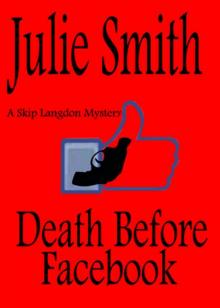 Death Before Facebook (Skip Langdon #4) (Skip Langdon Mystery) (The Skip Langdon Series)
Death Before Facebook (Skip Langdon #4) (Skip Langdon Mystery) (The Skip Langdon Series) P.I. On A Hot Tin Roof
P.I. On A Hot Tin Roof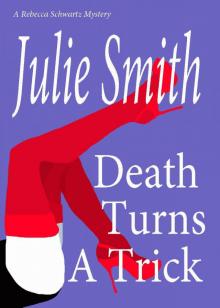 Death Turns A Trick (Rebecca Schwartz #1) (A Rebecca Schwartz Mystery) (The Rebecca Schwartz Series)
Death Turns A Trick (Rebecca Schwartz #1) (A Rebecca Schwartz Mystery) (The Rebecca Schwartz Series) The Axeman's Jazz (Skip Langdon Mystery Series #2) (The Skip Langdon Series)
The Axeman's Jazz (Skip Langdon Mystery Series #2) (The Skip Langdon Series) The Kindness of Strangers (Skip Langdon Mystery #6) (The Skip Langdon Series)
The Kindness of Strangers (Skip Langdon Mystery #6) (The Skip Langdon Series) Louisiana Hotshot
Louisiana Hotshot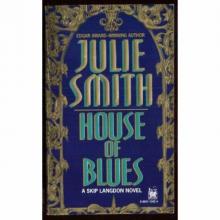 House of Blues
House of Blues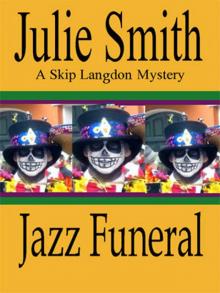 Jazz Funeral (Skip Langdon #3) (Skip Langdon Mystery) (The Skip Langdon Series)
Jazz Funeral (Skip Langdon #3) (Skip Langdon Mystery) (The Skip Langdon Series) Tourist Trap (Rebecca Schwartz #3) (A Rebecca Schwartz Mystery) (The Rebecca Schwartz Series)
Tourist Trap (Rebecca Schwartz #3) (A Rebecca Schwartz Mystery) (The Rebecca Schwartz Series) Louisiana Bigshot
Louisiana Bigshot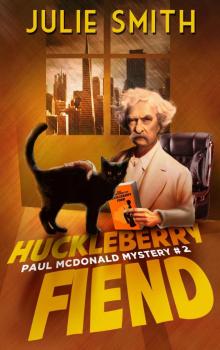 Huckleberry Fiend
Huckleberry Fiend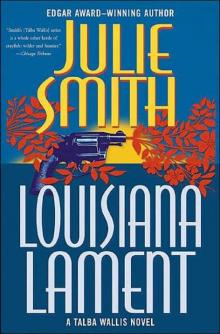 Louisiana Lament
Louisiana Lament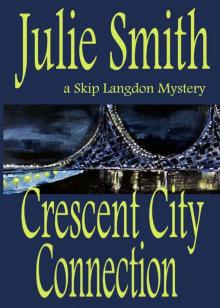 Crescent City Connection (Skip Langdon Mystery #7) (The Skip Langdon Series)
Crescent City Connection (Skip Langdon Mystery #7) (The Skip Langdon Series)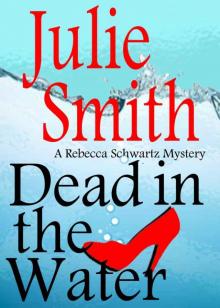 Dead In The Water (Rebecca Schwartz Mystery #4) (The Rebecca Schwartz Series)
Dead In The Water (Rebecca Schwartz Mystery #4) (The Rebecca Schwartz Series)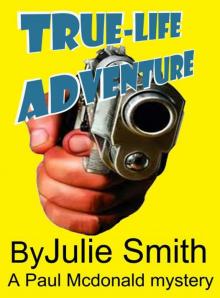 True-Life Adventure
True-Life Adventure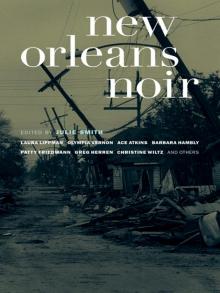 New Orleans Noir
New Orleans Noir